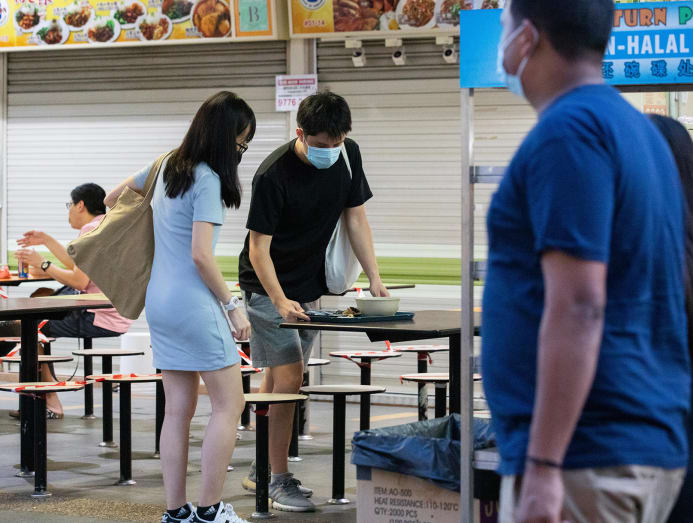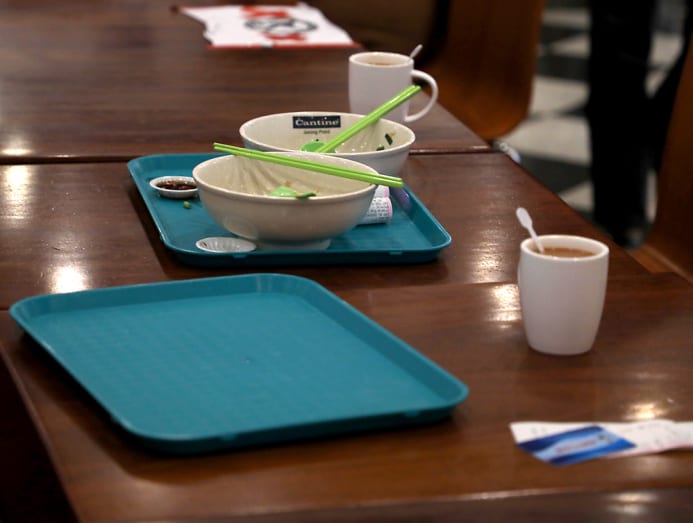Commentary: Trained by rules or basic decency? What our reactions to viral tray-clearing couple reveal about ourselves

It didn’t seem to occur to many that a Singaporean couple's act of kindness in clearing their trays after a meal could be simply that – an act of kindness.
You might have seen the video on your feed this past week: A young Singaporean couple clearing their trays after a meal in a Malaysian eatery.
The full video showed Mr Joshua Kho, 37, taking their dirty dishes to the counter while his spouse Ms Grace Ke, 32, stepped over to the neighbouring table to clear the trayful of utensils left behind by other patrons as well.
Despite the Port Dickson location of the cafe, netizens were quick to identify the pair as Singaporean. “Trained in Singapura,” said one commenter, with another remarking: “Finally all that training now can be put to good use!”
Amid the praise showered on the duo, the responses also reveal a deepset cynicism prevalent in the average Singaporean mindset. Many were quick to applaud Mr Kho and Ms Ke, but more were quicker to attribute their actions to a perceived conditioning by our nation’s strict cleanliness rules.
“Look at what the fear of being fined has made us into,” said one commenter.
It didn’t seem to occur to many that Mr Kho and Ms Ke’s act of kindness could be simply that — an act of kindness.
CREATING POSITIVE OUTCOMES
Now, there is no arguing the fact: Here in Singapore, we’ve got a lot of regulations. A sizeable chunk of these govern things people in other countries might not even think twice about: No tints on your car windows. No durians on the train. No e-scooters on footpaths.
Judging by the outsized online reactions to a simple act of clearing trays, the never-ending stream of do’s and don’ts has clearly made an impression on us.
But however we feel about the many rules woven into the fabric of our society, should we let it stop us from considering the impact of our own everyday actions?
Take another look at the rule in question: Clear your own trays after a meal.
When we clean up after ourselves in a public dining space, it saves someone else the effort of doing it for us and frees up the table space for other diners.
This is, inarguably, a positive tangible outcome — one that remains the same whether we’re doing it because we want to, or because we’ve been told to.
The reactions to Ms Ke and Mr Kho’s actions, however, speak to a disproportionately skewed fixation on the latter. It seems a lot of us would prefer to argue for a perceived “right” to do what we want, rather than weigh the good created by a minor, short-lived inconvenience such as this.
A 2021 study by the National Center for Biotechnology Information in the United States found that laws not only affect behaviour due to changes in material payoffs, but they also have a significant impact on social norms. They do this by changing the perception individuals have of such norms, either by shifting them directly or by providing information on these behaviours.
For all intents and purposes, Singapore’s “clear your own tray” rule has clearly managed to lay the ground for a new shared norm of cleaning up after ourselves — but is this all form with no substance?
The answer may be entirely up to us.

WHAT ARE WE ‘TRAINING’?
No society is perfect. Inequity and disparity will always peek through the cracks, and these cracks cannot always be smoothed over with one-size-fits-all mandates.
But placing our own comfort as our sole priority is no solution either. On the contrary, it can often wind up being a disservice, both to ourselves and those around us, especially when it comes to public spaces and resources.
“My mum's philosophy is to ‘leave it better than you found it’,” explains Ms Ke to TODAY. “It's just really basic human things that both our parents have instilled in us.”
To be sure, the question “Why are we being told?” is always a helpful one to ask — as long as that’s not where our train of thought grinds to a halt.
Scepticism, in healthy doses, undoubtedly has its uses. But deploy it on impulse too much and, over time, cognitive muscle memory can start kicking in too hard and too often.
In effect, we are indeed “training”: We train ourselves to stymie our own critical thinking. We practise sanding down our sense of compassion and empathy just so we can feel, for five minutes, that we’re “sticking it to The Man” or defying the powers that be.
Before we know it, we may start to find ourselves lashing out instinctually against any and all fresh guidelines and regulations — including the ones that serve to benefit us most.
But is this the best way to live among other humans?

In its annual Graciousness Survey, the Singapore Kindness Movement found a 7 per cent drop in Singaporeans’ overall satisfaction of neighbourliness in 2023 compared to 2022. Disputes and dissatisfaction between neighbours typically arise over issues pertaining to the disruption of quiet and cleanliness — second-hand smoke, for example, or noise.
The top reason cited by survey respondents (42 per cent) for not informing neighbours of such inconveniences? “It is only for a short time; I didn’t think it was necessary to inform my neighbours.”
Clearly, much of inconsiderate behaviour is driven not by malicious intent, but simple negligence. People don’t want to be unkind to other people; they’re just not thinking about being kind.
If a formal rule is what makes us think twice about leaving our own post-meal waste behind to greet the next diner, or bringing pungent foods into enclosed public transport spaces, or running the risk of injuring pedestrians with a personal mobility device — is that really so bad?
One need only look at the responses to the footage of Ms Ke and Mr Kho’s tray-clearing act: “So many people on the bus/MRT don’t say sorry when they bump into you or step on your foot by accident,” complains one commenter.
Here’s hoping we don’t need a fine to remedy that one.
ABOUT THE AUTHOR:
Melissa Lee Suppiah is a deputy editor at TODAY where she oversees commentaries.









